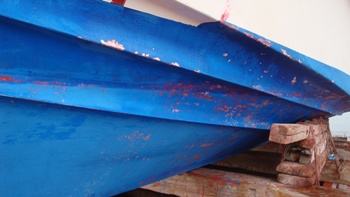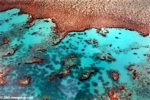Increasingly consumers are concerned about the chemical bisphenol A or more-widely known as BPA, which is present in certain plastics. The chemical is capable of leaching from plastic containers and liners into our food and drink. European, Canadian, and US governments have recently backtracked on longstanding arguments that BPA was not harmful and now warn that there is evidence that it is harmful to fetuses, infants, and maybe children and adults. Now, researchers announce a new place where the chemical BPA has shown up in surprisingly high concentrations: the world’s oceans.
Scientists have discovered that despite being known for their hardness, polycarbonate plastics actually decompose in oceans, leaching chemicals, including BPA, throughout the marine ecosystem.
“We were quite surprised to find that polycarbonate plastic biodegrades in the environment,” said Dr. Katsuhiko Saido with Nihon University in Chiba, Japan. “Polycarbonates are very hard plastics, so hard they are used to make screwdriver handles, shatter-proof eyeglass lenses, and other very durable products. This finding challenges the wide public belief that hard plastics remain unchanged in the environment for decades or centuries. Biodegradation, of course, releases BPA to the environment.”
 Organisms live off of the decomposing epoxy and polyurethane plastic paint used to seal the hull of this ship. Photo by: Katsuhiko Saido. |
Another likely source of the chemical is epoxy plastic paint used to seal ship hulls to protect them from rust and barnacles.
“When epoxy resin breaks down, it releases BPA, a typical endocrine disruptor,” Saido explained. “This new finding clearly demonstrates the instability of epoxy, and shows that BPA emissions from epoxy [plastic paint] do reach the ocean. Recent studies have shown that molluscs, crustaceans and amphibians could be affected by BPA, even in low concentrations.”
The researchers analyzed sand and seawater from over 200 sites across 20 countries, focusing on Southeast Asia and North America. All of the results showed what Saido calls “significant” BPA contamination: ranging from 0.01 parts per million to 50 parts per million.
The fact that plastics decompose in the oceans was first recorded last year by Saido and colleagues who showed that light, white-foamed plastic decomposed rapidly in the oceans, releasing toxins. However, this new discovery shows that even some of the world’s toughest plastics disintegrate in the marine environment, polluting it.
According to Saido, plastic is the main type of garbage in marine environments. Littering either directly in the ocean or being carried through waterways into the marine environment, plastics have created vast floating garbage islands. One between California and Hawaii is twice as Texas, and aptly known as the Great Pacific Garbage Patch. Another patch was recently announced floating in the Atlantic Ocean in the western Sargasso Sea; its size is unknown.
“Marine debris plastic in the ocean will certainly constitute a new global ocean contamination for long into the future,” Saido predicted.
Related articles
Plastic Vortexes Leaching Chemicals into World’s Oceans
(08/20/2009) While scientists have acknowledged the existence of billions of pounds of plastic containers, Styrofoam, and similar waste have created massive oceanic trash vortexes (floating islands of garbage), little is known of the effects of the dissolution of these materials into the water.
(08/20/2009) Scientists had assumed that plastics were basically indestructible. While floating plastic in the ocean was dangerous to particular species of marine life which consumed them or got snared by them, the scientists thought that the threat didn’t extend beyond this. However, a new study shows that plastic in the ocean may be quite insidious. Researchers found that so-called indestructible plastics actually decompose in the ocean, releasing potentially toxic substances throughout the seas.
Climate change causing irreversible acidification in world’s oceans

(12/15/2009) A new study from the Secretariat of the Convention on Biological Diversity has synthesized over 300 reports on ocean acidification caused by climate change. The report finds that increasing ocean acidification in the oceans will lead to irreversible damage in the world’s oceans, creating a less biodiverse marine environment. Released today the report determines that the threat to marine life by ocean acidification must be considered by policymakers at the UN Climate Change Conference in Copenhagen.
Plastic pollution in oceans inspires international event
(09/03/2009) For the past decade, an annual volunteer drive involving thousands of divers from all over the world has taken place in an effort to lessen the plastic content of the ocean. This year’s International Cleanup Day is scheduled for September 19th and registration is open to certified divers and other volunteers who would like to do their part to save a choking ocean.
Oil spill off Australia potential ‘disaster’ for marine wildlife
(08/30/2009) Oil is leaking from an offshore drilling rig in the Timor Sea near Australia’s Northwest coast. Authorities say it will be weeks before the leak is plugged: they are awaiting the arrival of a drilling rig from Singapore to plug the leak.







